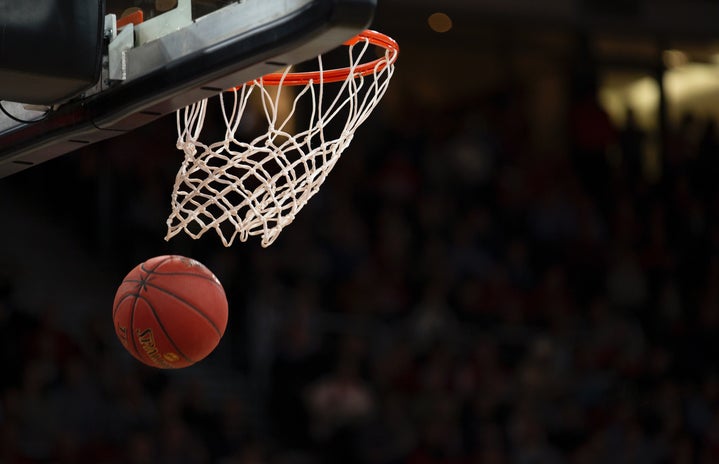“Sorry I have lacrosse practice”, was essentially my catchphrase for the entirety of my high school life. If I was busy, if I was traveling, if I was anywhere- it most likely had to do with lacrosse: the sport consumed my life. The first time I laced up a pair of cleats, strapped on some goggles, and picked up a stick I was about nine years-old. My parents signed me up for a recreational league one summer and I fell in love. From then on, I have played consistently for the past nine years. It takes dedication and real love to stick with something that long, yet as I round the second half of my first year of college I find myself taking a step back and retiring my cleats and beloved lacrosse stick for good.
A defender on the field until my freshman year of high school, I loved to play–win or lose. I played only recreationally until high school. Spring became lacrosse season instead of just the warming of weather, and lacrosse season was what I anticipated the most. Playing in middle school allowed me to be free, work hard, and feel satisfied with myself: it was all so uncomplicated.
I didn’t start playing club lacrosse until the summer before my freshman year of high school: this was the great turning point that broke my rose-colored glasses. The only reason I played at a club level was the notion that I wanted to play lacrosse at a competitive, division level in college. Who didn’t have the dream of being an athlete superstar in their youth? For some of my teammates, it was a dream within reach, but at 13, I had no idea if that was the dream I wanted, or if it was even accessible. Yet what seemed unattainable slowly started to feel feasible: I contrived such into being my life’s aspiration.
I worked hard, but it seemed like everyone else was working harder or just naturally better than me. So I changed positions on the field, playing as a goalie instead of defensively (the most mentally challenging position) to see if my success would change. This only pushed me to work harder. The minute I decided playing lacrosse in college was something I wanted to work for, the game itself began to put me slightly on edge.
My thought process was: if I wanted to play in college I had to make high school varsity as a freshman. I had to succeed on my club team because I had to orchestrate a highlight reel for college coaches whom I had to send formulaic emails just asking them to spend five minutes of their time watching me.
It was a lot of work and even more pressure. Each mistake I made felt like the deciding factor in a future I didn’t even know if I actually wanted. It felt like with everything I did there was a breathing down my neck expecting me to play to perfection. In my junior year of high school- the year where athletes start making verbal commitments to play at a division level- I cracked and decided I wanted none of it. While I continued to play at a more laid-back level, I subconsciously never felt the same way about my sport : the same anxious feelings I experienced when I was playing with future goals in mind loomed and worsened.
After any game or practice when I excelled, the celebration and praise I received from my teammates, coaches, and even my family and friends, gave me a high. Doing well in lacrosse became a crutch; through my sport, I felt like I had a purpose. I had worked so hard to be accomplished, and its payment felt beyond gratifying.
I was the captain of my high school lacrosse team my senior year, earned my 150th career save, and made the all-state and all-league roster. I trained tirelessly, yet was not in overdrive, so when I didn’t play like the game-winning-team-captain-goalie that I so desperately tried to mold myself into- when I had bad games or made a bad call- it felt awful. I rewired my brain into thinking that doing well in lacrosse was my purpose and my mode for proving myself worthy. Without succeeding in lacrosse I would be disappointing my parents, coaches, teammates, and friends.
Such were ideals I fabricated in my imagination. My parents, friends, teammates, and coaches still expressed their pride in me, no matter how I played. I couldn’t let myself understand why they encouraged me because in my brain they had no right to see me positively when I couldn’t see myself that way. To this day, I am eternally grateful for every one of my supporters, but so greatly disappointed in myself for being so blind in my own thoughts. Everything I thought was nothing but a self-inflicted wound. I had created a co-dependency and centered my life around a sport.
I apologized tirelessly to friends for asking them to come watch my games, and took blame for errors that sometimes weren’t even my fault. A minor mistake I made on the field cascaded into a storm of self-doubt and criticism. The littlest flaw would send me into tears and I would be so embarrassed by my emotions and frantically try to hide them, even if the scoreboard showed a winning score. The unrealistic zero-error standard I set for myself distracted me from seeing any good I did. I couldn’t let go of my mistakes. I cried in car rides home, and often couldn’t even get out of my car to walk up to the field for practice. There was one club practice during my sophomore year of high school where I physically couldn’t get out of my mom’s car. When I was finally home safe, I sat in my room silently suffocating in anxiety and heavy sobs. That may have been the first time in my athletic career where I felt like I was in such a severe state of stress, but it surely wasn’t the last: that feeling of self-doubt and extreme emotional response started to become normal. Who was I? I lost myself.
For the last nine years I played lacrosse. It was the one thing in my life that provided such a great source of joy, fulfillment, and stability. Being in the sport kept me active, social, and motivated. In those nine years, however, playing lacrosse was also my biggest source of anxiety, perfectionism, self-criticism, and tears. I mentally beat myself to a pulp, and what’s worse is that I knew I was doing it too, but I just couldn’t ever bring myself to walk away.
By the time I was a sophomore year in high school, I dreaded the spring because that meant it was almost lacrosse season. This was a major change from my previous excitement about the warmer months. Any of my friends can tell you that every year around the middle of February, like a broken record, I would always say “This is the year I finally quit,” before promptly enrolling myself for the season later that day.
As my senior season in high school rolled to its end, I was left with a bittersweet feeling of relief. When I received one of the highest accolades a student-athlete could receive at my high school as the girl’s lacrosse representative for that year, I was beyond honored- and to this day extremely grateful- but I could still hear that voice in my head asking me if I was even sure if I deserved it.
In college, although I was uncommitted, I had just expected that I would find a way to play at a club level. Lacrosse had come to feel like something I was required to do. I played a season of fall ball with the college club team here at CU. While the team was hands down one of the best I have ever played on, I couldn’t help but find myself slipping back into my old habits. Who was I even playing for? I finally came to accept that I wasn’t playing for myself out of passion, but rather because lacrosse was what determined my self-value: it was a toxic relationship.
It’s hard to come to terms with the end, maybe that’s why I could never bring myself to take a season off or just quit lacrosse. No matter how conscious I was of how I was treating myself while I was playing- the thought of not playing seemed more scary than just enduring the conscious mental abuse. So when I left my lacrosse bag at home coming back to school after break for my second semester as a freshman in college, I registered this lacrosse era was officially over. If I can have a moment of full transparency, I plotted multiple unrealistic ways to go back and retrieve my gear out of regret. Yet, over the course of the past few weeks, I have felt like I am walking away from the one thing I could confidently say I was good at, but I know it’s for the better.
While I want to say that I hate lacrosse, I know that it’s not true. I loved lacrosse, I loved the feeling of doing well and letting myself feel athletic. I loved the families I made on each team I played for, and I loved feeling like I was contributing to a community in a way that mattered. Lacrosse guided me to some of the greatest human beings whom I hold so close in my heart. Lacrosse gave me some of the happiest memories and best experiences that I can’t picture my life without.
Although the saying goes “When one door closes a new one opens,” I struggle to accept the closing of one door. Part of me is excited about the new possibilities I’m opening myself up to. Maybe by taking a step back, I’ll be able to start over and play again when I’m ready, and maybe, just maybe, I can reconnect with the little girl who was so excited to lace up her first pair of cleats and fall back in love with the thing I loved the most.


